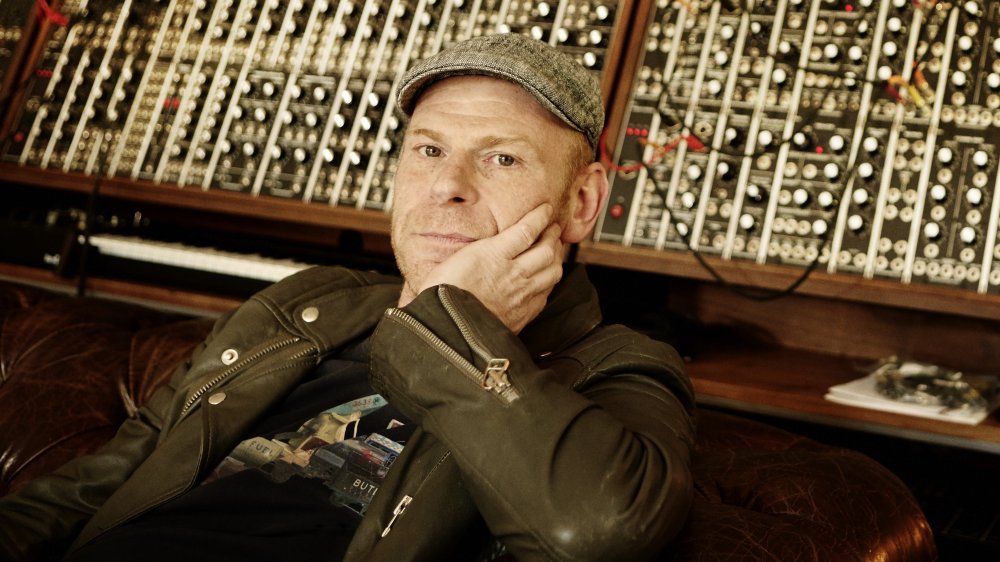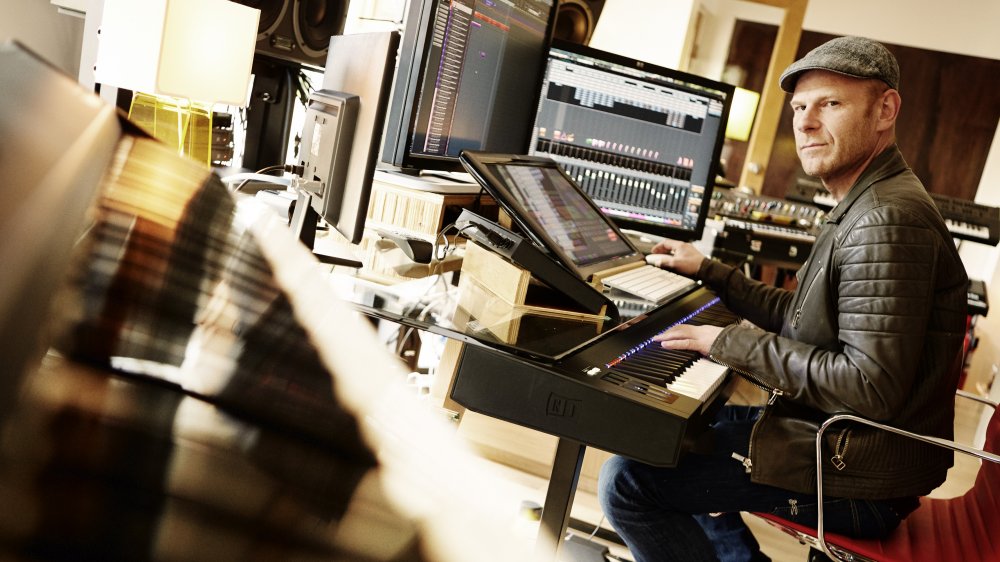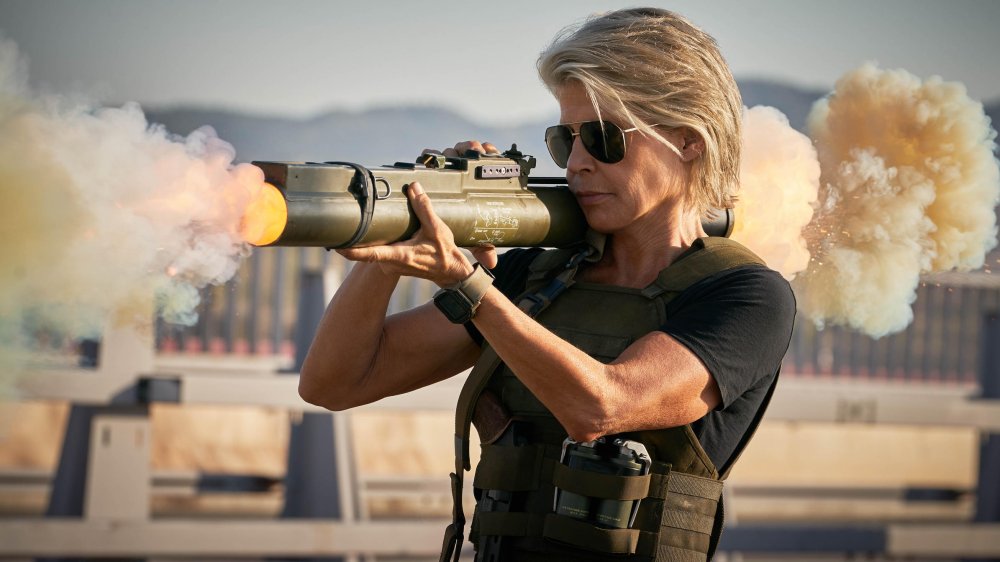How Tom Holkenborg's Terminator: Dark Fate Score Came To Be
The Terminator film franchise has been around for 35 years, but with the November 1 launch of Terminator: Dark Fate, the property feels fresher than ever. There's a level of familiarity to the new installment: James Cameron is back in the saddle, franchise icons Arnold Schwarzenegger (the powerful T-800 model Terminator) and Linda Hamilton (the ultra-badass freedom fighter Sarah Connor) reprise their respective roles, and the story expands on the iconic sci-fi film series instead of totally rebooting it. And yet, there's so much newness: Deadpool filmmaker Tim Miller sits in the director's seat, and Mackenzie Davis, Gabriel Luna, and Natalia Reyes join the franchise as a human-cyborg hybrid, the advanced Rev-9 Terminator prototype, and the young woman the new Terminator is after.
As a new chapter in the Terminator universe — one that serves as a direct successor to 1984's Terminator and 1991's Terminator: Judgment Day — Dark Fate aims to be a worthy follow-up to the nigh-impeccable original duology. The onus to achieve that goal wasn't just on director Miller, producer Cameron, and screenwriters David Goyer, Justin Rhodes, Billy Ray — it was also on Terminator: Dark Fate composer Tom Holkenborg, also known by his stage name Junkie XL.
A Grammy-nominated composer who has worked on massive films like Alita: Battle Angel, Batman v Superman: Dawn of Justice, Mad Max: Fury Road, Tomb Raider, and Deadpool (with Dark Fate helmer Miller), Holkenborg approached the much-adored Terminator franchise with care — and a careful vision. Looper spoke with Holkenborg ahead of the release of Terminator: Dark Fate about his work on the film, the places and faces from which he pulled inspiration, and how his score came to be.
Honoring 1984's Terminator and 1991's Terminator: Judgment Day
When asked how he approached scoring Terminator: Dark Fate, Holkenborg shared that his longtime love for the franchise laid a natural foundation for inspiration.
"I grew up with Terminator, so that was easy. The first Terminator was '84, and I was 17 at the time. I remember it really well. It was spectacular," he said. "The second one [Terminator: Judgment Day] was, for me, the favorite — I think for a lot of people, the one from '91."
Dark Fate being a direct sequel to 1991's Judgment Day and ignoring all follow-ups that came after it may have spelled trouble for a composer who absolutely adored the sights and sounds of 2003's Terminator 3: Rise of the Machines, 2009's Terminator Salvation, and 2015's Terminator Genisys. But for Holkenborg, crafting a score for a Judgment Day successor felt somewhat natural: as a consumer, he "lost track of what Terminator was" after Judgment Day, which made his job as a creator scoring Dark Fate all the more seamless.
What also aided Holkenborg's creative process for Terminator: Dark Fate was the many returning faces, both to the franchise and to the composer's own life: "There's something unique about this film, and that is the return of Linda Hamilton, a proper part for Arnold Schwarzenegger, and then on top of that, the return of James Cameron as a producer. And, of course, it was [my] second collaboration with Tim Miller."
Holkenborg then noted that the script for Terminator: Dark Fate was "really written in a sense that this is the third Terminator, not the other ones."
Bearing all that in mind, Holkenborg felt it vital to look back at the original Terminator and its sequel Judgment Day, get a feel for the music, and create a score for Dark Fate that would honor those two films and their theme, written by composer Brad Fiedel.
"I was like, okay, so if we have all these factors playing into the field, I think it's important to have a really good look at what the music was in the first two Terminators and pay a proper homage to Brad Fiedel and the theme he wrote for those two Terminator movies. That was definitely one of the things that I thought was important," said Holkenborg, who confirmed that it's "absolutely" accurate to say his Dark Fate score honors the original two films while also bringing the franchise into a whole new era.
"If you listen to the original score, you would potentially say today it's dated, because it's really like that typical synthesizer approach that they did in the '80s. And I don't think you can get away with that now. But nonetheless, the theme is so iconic, especially for Schwarzenegger. It might be, potentially, Schwarzenegger's most important role," Holkenborg explained. "So that is another thing that's pretty important: he's unmistakably attached to the Terminator franchise — and Linda Hamilton, too, for that matter. And so is the music.
He continued, "I think this is not the case where as a composer you say, 'Oh, I'm going to reinvent the wheel and do something completely new.' This was different than, for instance, when Hans Zimmer and I did Batman v Superman, where there's a new director, there's a new Batman, there's a complete new cast. Then, it actually makes sense to do something new because it's a new boot of a new type of franchise. But for me, [Terminator: Dark Fate] feels like the conclusion of the first two films. Therefore, it was important to look at that."
Terminator: Dark Fate's setting and characters inspired the score
Though Terminator: Dark Fate has ties to the past in that it's positioned as third on the list of installments rather than the sixth where it technically stands, it also represents an exciting future for the franchise — marked by the introductions of Mackenzie Davis as Grace, a half-cyborg from the year 2042; Natalia Reyes as Dani Ramos, the target of a new A.I. threat; and Gabriel Luna as Rev-9, the highly evolved, extra-strong Terminator with the ability to separate his metal parts from his "mimetic polyalloy" skin to create two additional Terminators. But that's only one piece of the puzzle: Dark Fate's primary setting sets it apart from its predecessors, and adds a jolt of visual and storytelling excitement.
Holkenborg indeed turned to Reyes' Dani Ramos and the south-of-the-border setting of Mexico City to create a score speckled with Latino influence. Several of the film's songs — including the Terminator: Dark Fate theme — feature the resonant plucking of Mexican guitars interspersed with impactful brass and thuds of drums you can feel in your chest.
"Pretty much 90 percent of the movie takes place in Mexico. There's a pretty full-on Latino cast in this," Holkenborg said — referencing Reyes as well as Diego Boneta (who plays Dani's brother Diego), Alicia Borrachero (who portrays the wife of Schwarzenegger's T-800, otherwise known as "Carl"), and Enrique Arce (who plays Diego and Dani's father).
He continued, "What was very important to me [was] that yes, I wanted to pay homage to the original score, but I'm also hired as a composer. For me, it was very important to give my own interpretation of that. Plus, it takes place in Mexico. So for me, it was very important that we had a lot instruments in the score that really reflect where we are — especially in the emotional scenes — because our new heroine is a Latino lady of 21, Dani."
Holkenborg revealed that he considered all these elements before he officially sat down to score Terminator: Dark Fate: "This all came into play before I even wrote one note. That was all taking place in my head."
Linda Hamilton's influence on the Terminator: Dark Fate score
As with Terminator and Judgment Day, Dark Fate features plenty of jaw-dropping, heart-stopping scenes — but a few very special moments were Holkenborg's most favorite to score.
"There's a few," Holkenborg said when asked if there was a scene he had the most fun scoring. "It's just because it puts a smile on your face as a composer, but then at the same time, I've been at a preview where just people went nuts. It's the introduction of Sarah, it's the introduction of Arnold, and then the end of the movie."
He then reiterated that scoring the scenes in which Linda Hamilton's Sarah Connor and Arnold Schwarzenegger's T-800 first appear on screen was "very satisfying."
From there, Holkenborg detailed that he had no trouble deciding how to score Arnie's introduction in Dark Fate, but ran into some issues figuring out exactly what to do for Hamilton's big moment.
"They're almost like dead giveaways, if you will — especially with Arnold. I didn't have to think longer than a second what to do there, but Sarah gave me some headaches because we wanted to create something that was tough [and] at the same time feels like, 'Oh, we know this character.' We definitely tried a bunch of different things there," he said. "Eventually, I settled on a combination between the traditional Terminator rhythm. First, the two feet out of the door — which is that classic, Arnold Schwarzenegger shot — and then the camera pans up and it's like, 'Oh wait, this is Sarah Connor, not the Terminator!' So we're playing a little bit with the audience there."
Ultimately, what Holkenborg wanted to create for Hamilton's Sarah Connor in the Terminator: Dark Fate score were moments that reflect how the actress has described herself in the past — as someone not afraid of getting older, someone very human, someone incredibly tough.
He explained, "I read this interesting article where she said she went into training camps to train with Marines and stuff, just to be a very tough woman, but she had no interest at all to look younger, or to look sexy, or anything like that. She loved the idea when people look at her and say like, 'Oh man, she got old!' She just loved that idea. That's what I read, what she said, and I think it was at Comic-Con [...] and so I thought the music needed to be like that. It needed to feel rough, but at the same time it needed to feel like, 'Oh, I know what this is.' That was important with her characterization instead of, like, the straight hero theme. There's a couple of spots where she barely makes it, and it's not her being necessarily the hero here. It's the combination of women that joined forces that eventually find a way — together with Arnold — to take this new Terminator head-on."
Terminator: Dark Fate is in theaters now. Tom Holkenborg's Terminator: Dark Fate score is available for purchase on digital now as well, with physical copies launching on Tuesday, November 5. Additionally, he's rolling out a five-episode Studio Time series on his YouTube channel about the making of the Dark Fate score.



